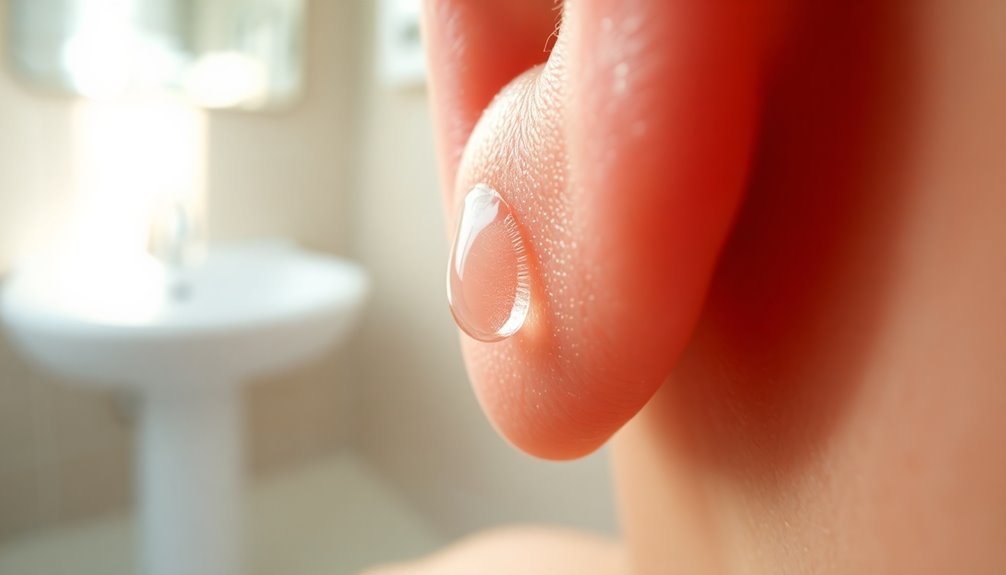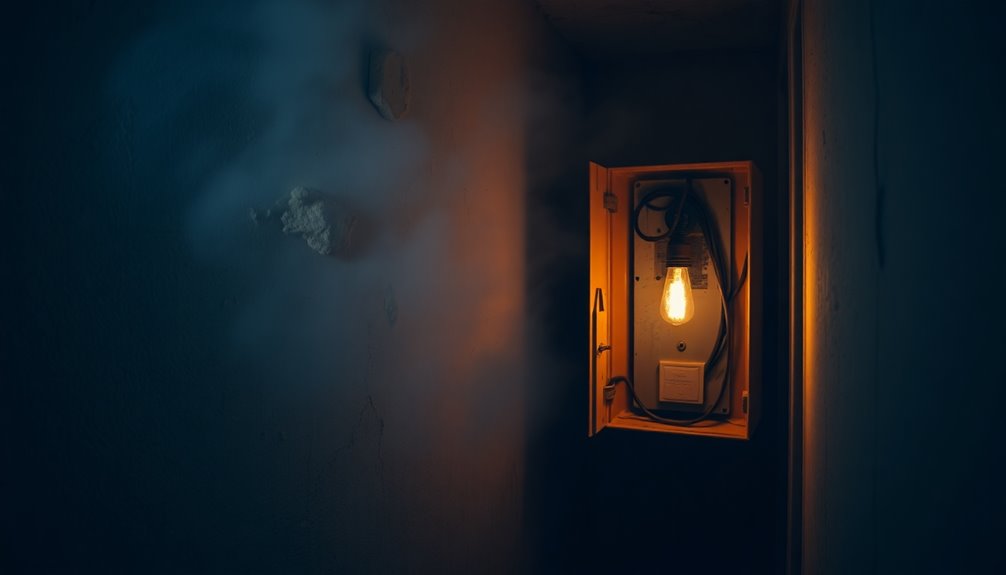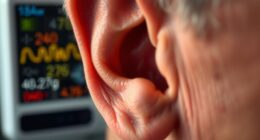If your ear feels wet, it's often due to excessive earwax or fluid buildup from allergies. Earwax can create that unpleasant sensation, especially if it hardens or expands with humidity. Allergies can cause inflammation, leading to fluid accumulation in your ears. Additionally, ear infections might contribute to a feeling of dampness and discomfort. It's also worth checking if your sleeping position is impacting normal drainage. Whatever the cause, managing moisture and maintaining ear hygiene is essential. You might find it interesting to discover other factors that can lead to that gross sensation lurking in your ear!
Key Takeaways
- Excess earwax can create a wet sensation, especially when combined with moisture from humidity or sweating.
- Eustachian tube dysfunction may lead to fluid buildup, causing discomfort and a feeling of fullness in the ear.
- Allergies and sinus issues can result in mucus production that blocks the Eustachian tubes, contributing to a wet feeling.
- Ear infections often produce fluid in the ear, leading to sensations of wetness, pressure, and pain.
- Proper ear care, including managing earwax and avoiding moisture, is essential to prevent discomfort and infections.
Understanding Ear Wax Production
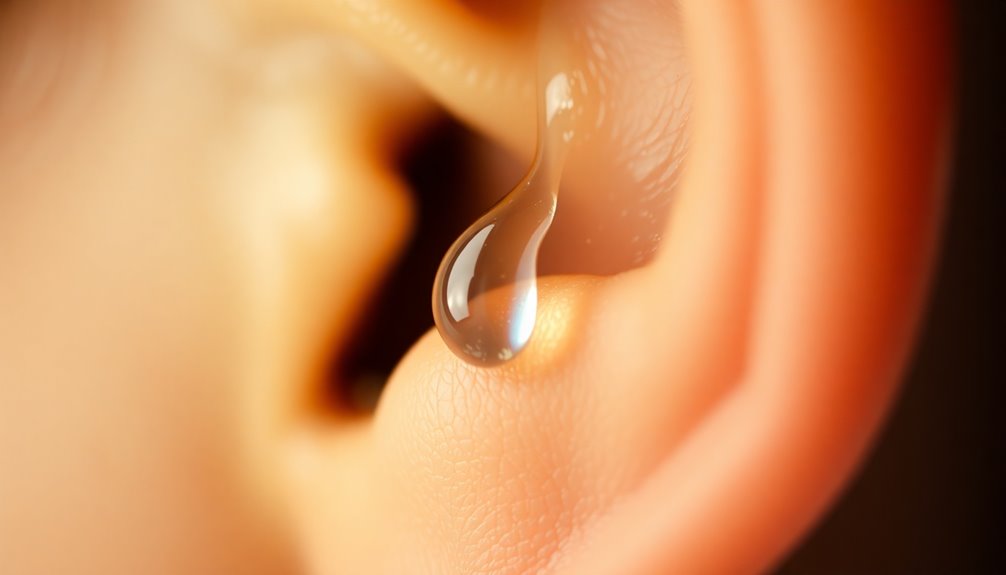
Earwax production plays a crucial role in maintaining ear health. This natural substance, known as cerumen, is primarily composed of long-chain fatty acids, cholesterol, alcohols, and squalene. The long-chain fatty acids provide a waxy texture and a protective layer, while cholesterol helps keep earwax from becoming too dry or runny. Alcohols like lactic acid and isopropanol work to inhibit bacteria and fungi, keeping your ears safe from infections.
Earwax is secreted by specialized sebaceous and modified apocrine glands located in the outer third of the ear canal. Here, dead skin cells, particularly keratin, and even hair contribute to the mixture. This combination not only protects your ears from dust and foreign particles but also lubricates the ear canal, preventing dryness. Interestingly, humans shed over 1 million skin cells into the ear canal per hour, which contributes to earwax formation.
Moreover, earwax aids in self-cleaning; natural movements like chewing and talking help expel wax and debris. Its antimicrobial properties and insect-repelling capabilities further demonstrate how essential earwax is for your ear health. By understanding earwax production, you can appreciate its vital role in keeping your ears clean and functioning properly.
Impact of Sweating and Humidity

Humidity and sweating can significantly impact your ear health, often leading to discomfort and potential complications. High humidity creates a moist environment in your ear canal, which promotes the growth of bacteria and fungi, increasing your risk of infections like swimmer's ear. If you've ever noticed that your ears feel wet, it might be due to this excess moisture, making you more susceptible to painful conditions.
In humid conditions, earwax can soften and expand, leading to blockages that cause discomfort and even hearing issues. You might also experience a feeling of fullness or pressure in your ears, as excessive moisture can alter the balance of fluids in the inner ear, potentially causing dizziness and imbalance. Additionally, high temperatures can thicken inner ear fluids, which might contribute to that uncomfortable sensation of wetness. Regular exercise can help improve overall health, making your body more resilient to infections, including those affecting the ears. Furthermore, staying hydrated by consuming vitamins and nutrients can support your immune system and help combat potential ear infections.
Moreover, humid environments can exacerbate existing ear infections by maintaining a moist setting that encourages microbial growth. If you're prone to ear issues, you may find that high humidity worsens your symptoms, like pain and fluid discharge. To protect your ear health, make sure to dry your ears thoroughly after swimming or exposure to moisture, and consider using ear protection to manage moisture levels effectively.
Fluid From Allergies and Sinus Issues

Sometimes, the sensation of wetness in your ear can be attributed to fluid buildup caused by allergies and sinus issues. When you encounter allergens, your body releases histamine, which triggers inflammation and leads to increased mucus production. This inflammation can block your Eustachian tubes, preventing fluid from draining effectively from your middle ear. During this time, it's beneficial to focus on your vibrational energy to help manage your overall well-being. Additionally, resolving these issues often requires understanding the trust issues that can arise in personal relationships due to stress. Regular hydration can also support your body's ability to manage mucus production effectively. Incorporating anti-inflammatory herbs like turmeric can also help alleviate symptoms related to sinus issues, while maintaining a balanced diet rich in low carb foods can enhance your overall health.
Additionally, sinus pressure can push against your ear, causing that clogged feeling. Fluid from your sinuses or throat may travel up the Eustachian tubes, getting stuck and contributing to that uncomfortable sensation. If you're experiencing sinusitis, the inflammation can further block drainage, leading to more fluid accumulation. To help manage these issues, you can consider downloading the Piedmont Now App, which provides resources and guidance for your healthcare needs.
You might notice symptoms like a feeling of fullness, pressure in your ears, pain, or reduced hearing due to this buildup. To manage these issues, avoid allergens by staying indoors during high pollen counts, and consider using over-the-counter antihistamines to alleviate symptoms. Saline mist or nasal sprays can help moisturize your sinuses, while nasal steroid sprays may be effective for severe reactions. If symptoms persist or worsen, consult your doctor for further evaluation and possible treatment.
Ear Infections and Inflammation
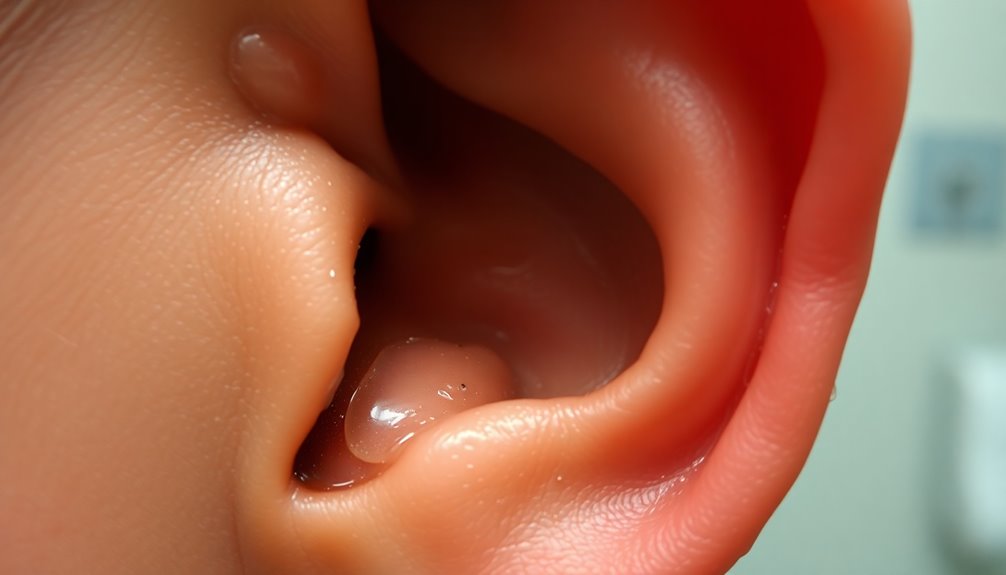
Experiencing discomfort in your ear can often signal an underlying ear infection or inflammation. These conditions frequently arise from upper respiratory infections, which can cause fluid buildup and that unsettling wet sensation. If your Eustachian tubes are blocked due to swelling or infection, fluid can't drain, exacerbating the feeling.
You might also encounter infections like otitis externa, commonly known as swimmer's ear, especially after exposure to dirty water or not properly drying your ears. Overzealous cleaning can damage your ear canal, leading to infections and fluid accumulation. Eustachian tube dysfunction can also contribute to the sensation by trapping fluid in the middle ear.
Symptoms of ear infections include earache, fever, and discharge that may contain pus or wax. You might notice muffled hearing or itchiness, indicating irritation in the ear. Types of infections like otitis media, infectious myringitis, and chronic suppurative otitis media can all contribute to that wet sensation.
Treatment often involves professional cleaning, antibiotics, or antifungal medications to clear the infection and reduce fluid buildup. Managing your ear hygiene and keeping them dry after swimming are crucial steps in preventing future problems.
Role of Sleeping Position

When dealing with ear infections or discomfort, your sleeping position can significantly impact your symptoms. Sleeping on your back with your head elevated can help reduce pressure in your ear canal, alleviating some discomfort. Using extra pillows or a wedge pillow is an easy way to maintain this elevated position. If one ear is affected, try lying on the unaffected side; this position can promote drainage from the infected ear and relieve that annoying wet sensation.
Avoid lying directly on the infected ear, as this can intensify pressure and pain. Elevating your head not only aids in relieving discomfort but also helps with fluid drainage which is crucial during an infection. Additionally, proper drainage can minimize that clogged feeling you may experience.
Choosing to sleep on your side or back with your head elevated can improve your overall comfort, allowing for better sleep quality. It's also wise to steer clear of stomach sleeping, as it might worsen the infection. Maintaining a comfortable sleeping position is essential for managing ear health and symptoms during an infection, so make adjustments as needed for a better night's rest.
Other Causes and Precautions

Beyond sleeping position, several other factors can contribute to that unsettling wet sensation in your ear. One key culprit is Eustachian tube dysfunction, which can cause a crackling or popping sound and give you that watery feeling. If you've recently had a cold or allergies, fluid buildup in the middle ear may lead to infections, bringing symptoms like earache and pressure. Persistent water may lead to tinnitus and dizziness, which can exacerbate the discomfort you're experiencing.
Swimmer's ear, or otitis externa, arises when water lingers in the outer ear, promoting bacterial growth. You might notice itching, redness, or pain, especially if you touch the outer ear. In such cases, it's essential to see a doctor for prescribed eardrops.
Don't overlook earwax buildup either. Excessive wax can mimic that wet sensation, particularly when you wake up. Avoid using cotton swabs, as they can push wax deeper, worsening the issue. Instead, gently rinse your ears and consult an audiologist for proper care.
To prevent these issues, keep your ears dry after swimming or showering. Using earplugs and drying your ears thoroughly can help. Remember, if you have ear tubes or a ruptured eardrum, be cautious with cleaning methods.
Frequently Asked Questions
Can Certain Medications Cause Ear Moisture?
Yes, certain medications can definitely cause feelings of ear moisture. Ototoxic medications, like some antibiotics and diuretics, may alter ear function, leading to sensations that mimic moisture. Additionally, ear drops used for wax removal can create a temporary feeling of fullness or wetness in your ears. If you notice these sensations, it's essential to consult your doctor to discuss your medications and any side effects you might be experiencing.
How Can I Prevent Ear Wax Buildup?
To prevent earwax buildup, use ear drops regularly to soften wax, making it easier for your body to expel it. Avoid using cotton swabs or any foreign objects, as they can push wax deeper. If you're prone to excessive buildup, consider microsuction from a professional. Also, keep your ears dry and clean, and limit the use of earbuds or hearing aids, which can trap wax and hinder its natural removal.
Is It Safe to Use Ear Drops if My Ear Feels Wet?
If your ear feels wet, using ear drops can be safe, but you should consult your doctor first. They'll determine if the drops are appropriate for your situation. Make sure to follow the instructions carefully, only apply them to the affected ear, and avoid using them if you suspect a ruptured eardrum. Keeping your ear clean and dry is essential, so follow any additional precautions your healthcare provider recommends.
When Should I See a Doctor for Wet Ears?
If you're experiencing wet ears, it's important to know when to see a doctor. Seek immediate medical attention if you notice fluid or blood leakage after a head injury, or if you have yellow, green, or smelly discharge. Fever, dizziness, or persistent pain also warrant a visit. If the wetness lasts more than three days, or you're under six months old with any discharge, don't hesitate to consult a healthcare professional.
Can Stress Lead to Excessive Ear Moisture?
Yes, stress can lead to excessive ear moisture. When you're stressed, your body reacts by altering blood flow and muscle tension, which can affect your ear functions. This might create a sensation of fullness or moisture in your ears. Additionally, stress can exacerbate tinnitus symptoms, making you more aware of any unusual sensations. Managing stress through relaxation techniques and regular exercise can help alleviate these symptoms and protect your ear health.
Conclusion
In conclusion, a wet feeling in your ear can stem from various sources like ear wax, sweating, allergies, or even infections. It's important to pay attention to any accompanying symptoms and consult a healthcare professional if you're concerned. You might also want to be mindful of your sleeping position and environmental factors. By staying aware and taking precautions, you can help keep your ears comfortable and healthy. Don't ignore that sensation; it might be your body trying to tell you something!
